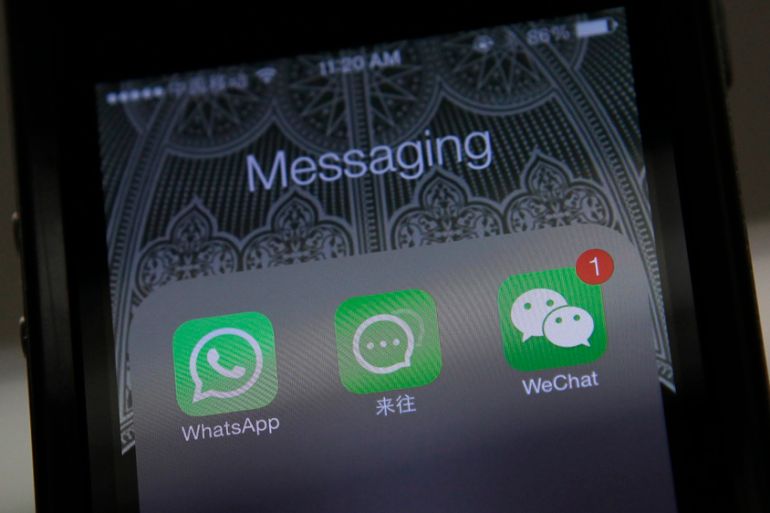Black UPenn students speak out after racist messages
First year students at University of Pennsylvania were added to a chat group and subjected to threats of lynching.

Black students at the University of Pennsylvania (UPenn) have said they were afraid to attend classes after a number of undergraduates were added to a chat group that subjected them to racial slurs and threats of lynching.
The incident comes amid a spike in hate crimes and racist behaviour in the United States after the election of Republican candidate Donald Trump as president on Tuesday.
Keep reading
list of 4 items‘Feel less and less like playing’: Vinicius Jr in tears over racist abuse
‘Rendered invisible’: A wave of anti-Arab violence tests US hate crime laws
Germany bans far-right Austrian nationalist Martin Sellner from entry
Officials at the University of Oklahoma on Saturday announced they had suspended one of its students for alleged involvement in sending racist messages, as US media reported the FBI was helping UPenn to investigate the matter.
Messages in the group referred to black people as n******, c***s, and dumb slaves, while one read: “All heil TRUMPMEISTER”.
Those behind the group also posted pictures of historic murders of black people in the US, and created an event titled “Daily Lynching”, further asking the students if they were “going?”.
READ MORE: Black Americans fear racism, police violence post-Trump
Al Jazeera spoke to several black students and alumni at the university who expressed their sadness and anger over the incident.
“I was horrified, outraged, disgusted,” said UPenn biology senior Sarah Gubara, who blamed the election for emboldening the racists.
“This incident showed me that Trump had empowered a lot of people to feel more comfortable being hateful and violent towards black people.”

Gubara told Al Jazeera many of the affected students had only started university two months ago, and the racism had already marred their experience.
“I don’t know if there could have been a worse way to start off a college education for the freshmen.
“They’ve only been on campus for two-and-a-half months, have just started to become comfortable, their support networks are so small.”
Gubara said the week’s events had also taken a toll on her own ability to study.
“I have an exam on Monday and I am so scared that I am going to fail because I was not able to dedicate myself to my studies. I was busy comforting and supporting my community, my only safe space, my family.”
‘Larger problem’
Gubara and others said this particular racist outburst was part of a bigger picture of tensions at the university.
“I think that racism didn’t just appear on campus,” said Maryam Alausa, a board member of Umoja, a black student umbrella organisation.
“It’s been here but previously it has been expressed in implicit ways or in the form of micro-aggressions.
“I think a group of people who haven’t been able to speak their mind are now emboldened to do as they please – and that is what we’re seeing the results of.”
Students of all schools gathering to protest the racist attacks on UPenn freshman #UPennWeGotUs pic.twitter.com/lOSWlz8Q1T
— FJ Thee REAL Racist (@FeministaJones) November 11, 2016
Sydette Harry, a UPenn alumnus, said there was a sense on the campus that black students did not truly deserve to be in such a reputable institution.
“Upper tier universities have that dynamic,” Harry said.
“Penn is an Ivy League university so Penn, Harvard, Brown, and Columbia have a very specific kind of tension because there’s always this expectation or assumption that you [as a black person] are not supposed to be there.”
Harry, who works on Mozilla’s Coral Project, also raised questions about how sensitive information, like the students’ phone numbers, were obtained by those behind the chat group.
“There’s also an informational security issue. How were they able to isolate black students and put them in a group.”
University response
In a statement released on Saturday, University of Pennsylvania President Amy Gutmann said she was “absolutely appalled” by the incident.
“The racism of this GroupMe message is profoundly inimical to what we stand for as a university,” Gutmann said.
“We will take every step possible to counteract its appalling bias.

“And we all stand together in solidarity with our black students who have been so terribly targeted.”
However, the impact of the messages on racial tensions on campus may be hard to reverse, according to students Al Jazeera spoke to.
“I am the minority in most of my classes, how could I possibly sit there knowing there may be people in the room that think it’s okay to lynch black students?” Gubara asked.
For Harry, such thoughts represented an “unfair burden” on black students.
“It’s not your responsibility to decode which of your classmates is racist or not,” Harry said.
“They [students] are like I don’t know who’s racist and who’s not, and I don’t know how we’re going to move forward, and how we’re going to heal.”
She said as victims it wasn’t the responsibility of the targeted students to reconcile with the perpetrators.
“My message to them is that it is your responsibility to be safe, secure, and try to finish your education and do the best you can. We are here for you, alumni are here to help.”
|
|